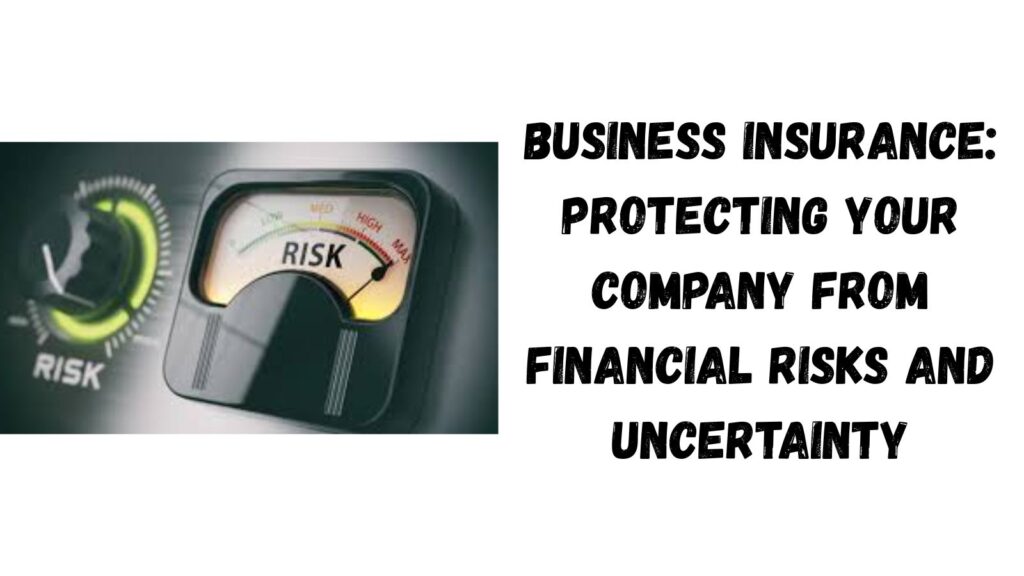Business insurance is important for all companies, big or small. It protects them from financial risks and uncertainties. Every business faces risks, from property damage to potential legal claims. A business needs the right insurance. Without it, it could face serious money problems. This might even lead to bankruptcy or closure.
In today’s unpredictable business environment, business insurance is not a luxury—it’s a necessity. As a business owner, it’s vital to ensure that your company is well protected from a wide range of risks. In this article, we’ll look at various types of business insurance. This includes general liability insurance, property insurance, workers’ compensation, and professional liability insurance. We’ll share real-time examples, fun stories, and cool facts to make this topic engaging and relatable.

Why Business Insurance is Important
Contents
- 1 Why Business Insurance is Important
- 2 Types of Business Insurance
- 3 Why Every Business Needs Insurance
- 4 Conclusion
- 5 FAQs on Business Insurance
- 6 What is the difference between general liability and professional liability insurance?
- 7 Is workers’ compensation insurance mandatory for all businesses?
- 8 Can I add business interruption coverage to my existing insurance?
- 9 Do small businesses need professional liability insurance?
- 10 How much does business insurance cost?
No matter what type of business you operate, unforeseen events can quickly lead to significant financial losses. A single lawsuit, a fire, or an employee injury could be enough to bring your business to its knees. Business insurance reduces risks. It provides financial protection for damages, legal fees, lost income, and medical costs.
In 2020, the National Association of Insurance Commissioners (NAIC) found that over 75% of U.S. businesses had commercial insurance. This statistic shows that more people understand how important it is to protect business assets, employees, and reputation.
Types of Business Insurance
Many types of business insurance exist to protect different parts of your operations. Let’s break down the main types of business insurance and what each one covers.
1. General Liability Insurance
What it Covers: General liability insurance is the most basic form of business insurance. It protects your business from legal costs and damages if you are sued for causing injury or property damage to others. This type of insurance is essential for every business, regardless of size or industry.
What’s Included:
- Bodily Injury: This covers medical bills and legal fees if someone gets hurt on your property or because of your business activities.
- Property Damage: Covers the costs of repairing or replacing another person’s property that your business has damaged.
- Advertising Injury: This covers legal fees if someone claims your ads hurt their business’s reputation.
Real-Time Example: Let’s say you own a restaurant, and a customer slips and falls on a wet floor inside your restaurant. The customer sues you for medical bills and lost wages. General liability insurance pays for medical costs, legal fees, and any settlement or judgment from a lawsuit.
Fun Fact: Did you know that 43% of small businesses are at risk of facing a liability lawsuit? General liability insurance protects your business from unexpected legal claims. It helps you avoid costly financial issues.
2. Property Insurance
What it Covers: Property insurance protects your business’s physical assets. This includes office space, equipment, and inventory. It covers damage or loss from events like fire, theft, vandalism, or natural disasters. This type of insurance can help your business recover the value of lost or damaged property and ensure business continuity.
What’s Included:
- Building and Contents Coverage: This protects your business property and what’s inside, like computers, furniture, and machinery.
- Business Interruption Insurance: This insurance pays for lost income and ongoing costs if your business is interrupted by events like a fire or storm.
- Inventory Protection: Covers your business’s inventory from loss or theft.
In 2018, a tech company in California faced a huge fire. It wiped out their office and all the equipment inside. The company had property insurance. It covered the costs to replace their damaged equipment and office space. Without this coverage, the company would have faced major financial issues and delays in returning to business.
Fun Fact: Studies show that 25% of businesses hit by a major disaster (e.g., fire or storm) never reopen. Property insurance helps mitigate the financial damage caused by such events, making it a vital safety net for any business.
3. Workers’ Compensation Insurance
What it Covers: Workers’ compensation insurance helps employees who get hurt or sick at work. This insurance is vital for businesses with employees. It helps injured workers get paid for their medical bills, lost wages, and rehab costs.
What’s Included:
- Medical Expenses: Covers the cost of medical treatment for employees who are injured or become ill at work.
- Lost Wages: Provides a portion of the worker’s salary while they are unable to work due to their injury or illness.
- Disability Benefits: Offers payment if an employee is permanently disabled from a workplace accident.
- Rehabilitation Costs: Covers the cost of rehabilitation and vocational training if the employee is unable to return to their previous job.
Real-Time Example: Consider a construction company with employees working on a job site. One of the workers falls and injures his leg. Workers’ compensation insurance will pay for his medical bills and replace his income while he recovers. This helps the worker avoid financial hardship during his time off.
Fun Fact: In 2020, U.S. employers paid out nearly $50 billion in workers’ compensation benefits. Workers’ compensation insurance keeps employees safe and also shields employers from lawsuits.
4. Professional Liability Insurance
What it Covers: Professional liability insurance, also known as errors and omissions (E&O) insurance, protects professionals. This includes doctors, lawyers, and accountants. It guards against claims of negligence, mistakes, or not delivering promised services. It’s particularly important for service-based businesses where the risk of making errors or omissions is high.
What’s Included:
- Negligence: Covers legal costs and damages if a client accuses you of failing to meet professional standards or causing harm due to your negligence.
- Mistakes: Protects against legal costs if a client sues for mistakes made during your work.
- Failure to Perform: Covers claims of failing to complete a job or deliver services as agreed upon.
Real-Time Example: A lawyer may get sued by a client. The client might believe they didn’t get enough legal help. If the lawyer made a mistake or didn’t do their job right, professional liability insurance would pay for the lawsuit costs. This includes legal fees and any settlements.
Fun Fact: Professional liability insurance can save you from losing your professional license!
Why Every Business Needs Insurance
Without proper insurance, a business could face catastrophic financial losses. Incidents like employee injuries, customer lawsuits, or fires can lead to huge costs. These financial burdens can grow rapidly. Business insurance protects your company’s assets. It also shows customers and employees that you are ready for unexpected events. This helps maintain good relationships with them.
Conclusion
Business insurance is an essential tool in protecting your company from financial risks. You can protect your business with various insurance options. These include general liability, property insurance, workers’ compensation, and professional liability. Each helps guard against the unexpected. Choosing the right insurance for your needs helps your business bounce back from disasters. This way, you can keep operations running without facing major financial losses.
Businesses with good insurance can better face unexpected challenges, as real-world examples show. No matter if you’re a small startup or a big company, getting good business insurance is a smart way to safeguard your future.
What Insurance Agents Don’t Tell You About Choosing the Right Plan – And Why It Matters
FAQs on Business Insurance
What is the difference between general liability and professional liability insurance?
General liability protects against claims of bodily injury or property damage. Professional liability, on the other hand, covers errors or negligence in professional services.
Is workers’ compensation insurance mandatory for all businesses?
In most states, businesses with employees are required to carry workers’ compensation insurance. However, requirements may vary based on the number of employees and the type of work.
Can I add business interruption coverage to my existing insurance?
Yes, you can usually get business interruption coverage as an add-on to property insurance. This coverage helps replace lost income if your business can’t operate due to a covered event.
Do small businesses need professional liability insurance?
Yes, service-based small businesses, like consultants and accountants, should get professional liability insurance. This protects them from claims of negligence or mistakes in their services.
How much does business insurance cost?
Business insurance costs vary based on several factors. These include the size of the business, the industry, its location, and the coverage needed. Small businesses usually pay a few hundred to several thousand dollars each year for full coverage.
Business insurance isn’t just about safeguarding against risks; it’s about ensuring the longevity and growth of your business. Make sure you understand your company’s needs and seek out the best coverage options to protect it.


